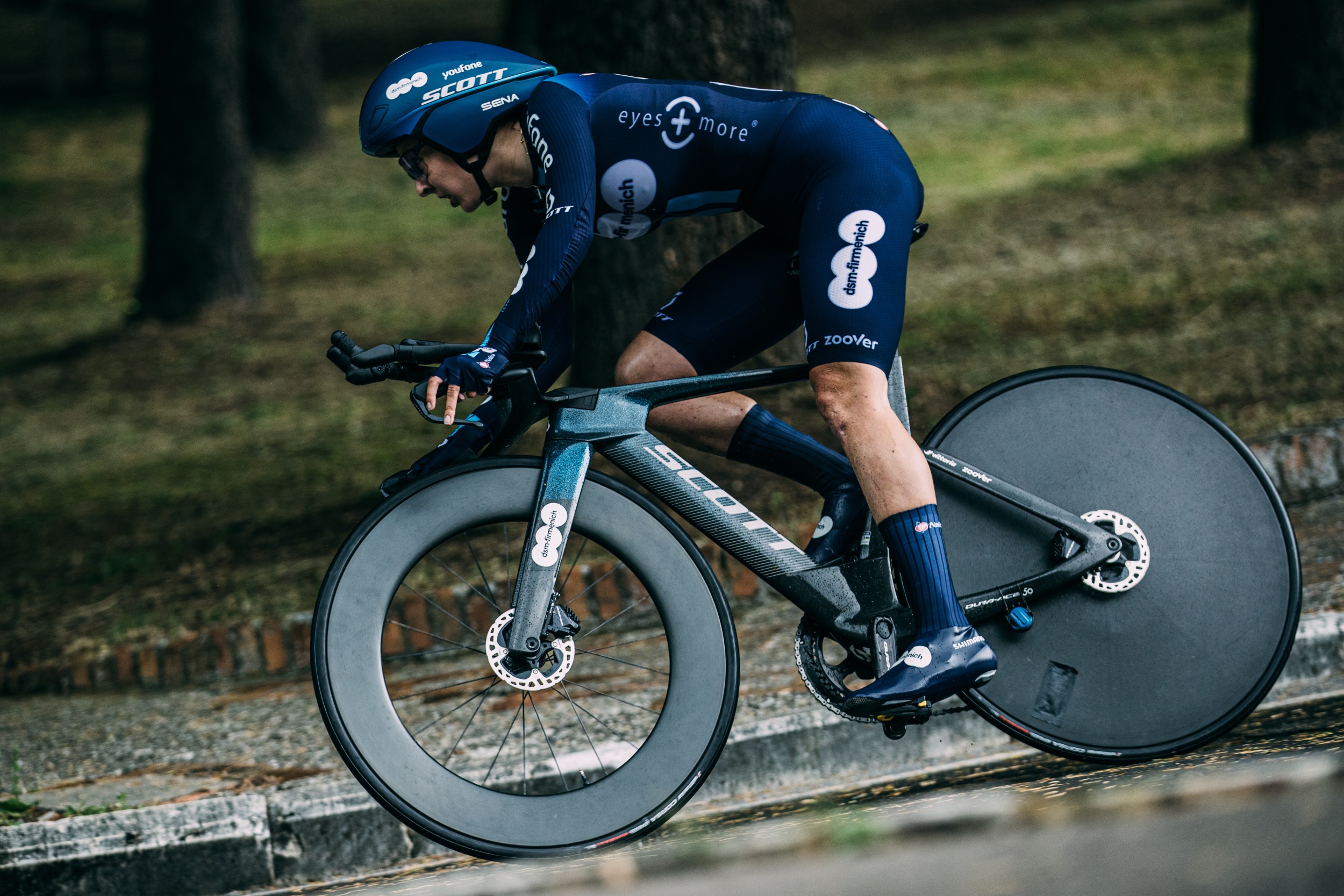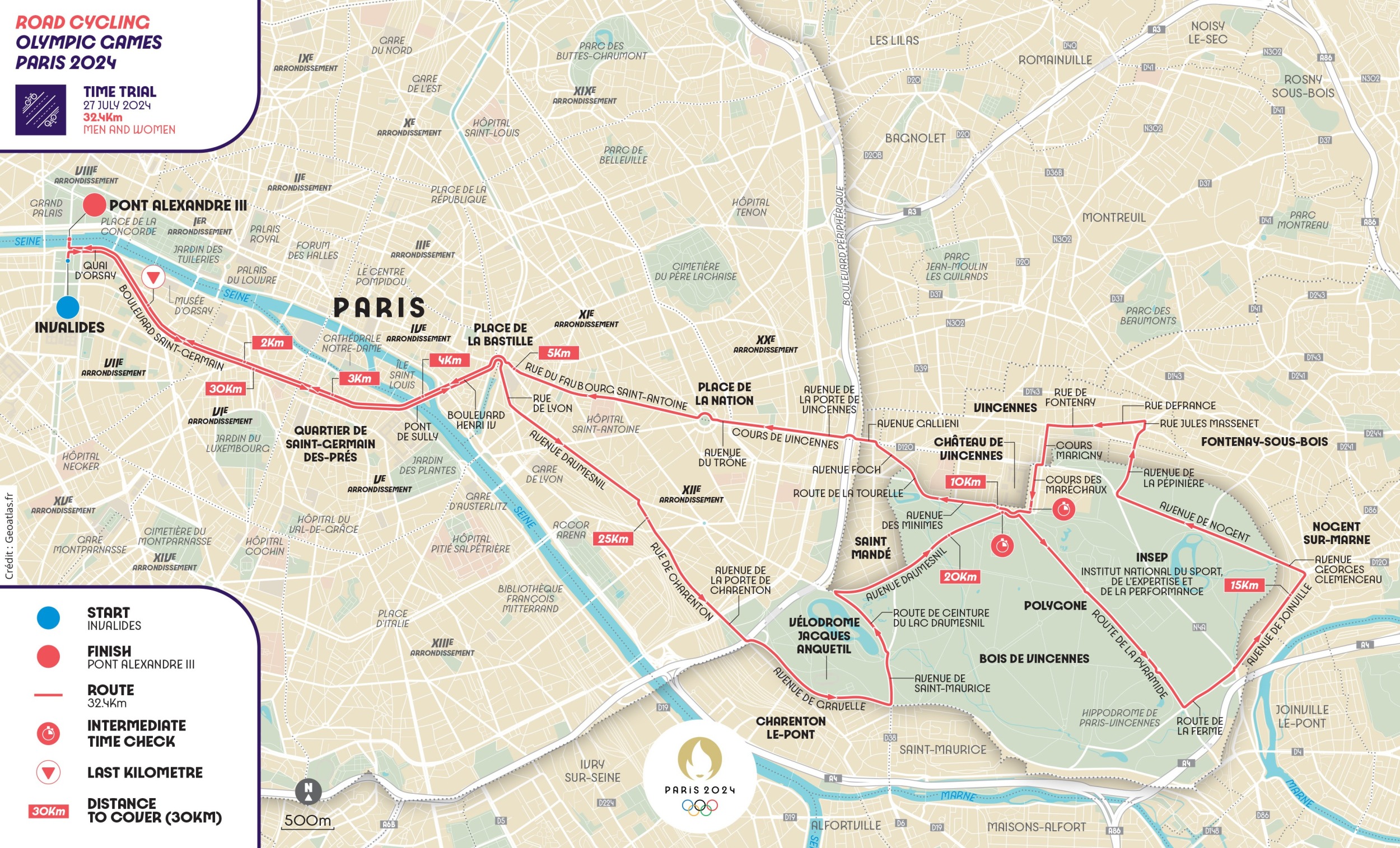

The 2024 Olympic Women’s Time Trial, set against the historic and picturesque backdrop of Paris, is poised to be a spectacular display power, and endurance. This 32.4-kilometer race promises not only a test of speed and strategy but also a visual treat as competitors navigate through some of Paris’s most iconic landmarks.
Course Overview
Start and Finish:
The race begins at the Esplanade des Invalides, a historic complex in Paris that houses museums and monuments, all relating to the military history of France. This start location sets a grand tone for the event, with riders launching from a spot steeped in historical significance. The finish line is set at the Pont Alexandre III, one of the most ornate bridges in Paris, renowned for its stunning architecture and historical importance.
Route Details:
The 32.4-kilometer course is virtually flat, featuring only 111 meters of elevation gain. This flat profile emphasizes the importance of sustained power output and aerodynamic efficiency, making it an ideal course for pure time trial specialists.
Esplanade des Invalides to Place de la Bastille:
The race kicks off with a fast section along the Boulevard Saint-Germain, a major thoroughfare in Paris that allows riders to quickly get up to speed. Riders then cross the River Seine at Pont de Sully, heading towards the Place de la Bastille. This initial stretch includes some gentle curves but allows competitors to maintain high speeds.
Place de la Bastille to Bois de Vincennes:
The course continues east along Avenue Daumesnil and Rue de Charenton, leading into the Bois de Vincennes, the largest public park in Paris. This section includes a series of tighter turns and a more technical layout, demanding precision and good bike handling skills.
Bois de Vincennes Loop:
The route loops through the park, passing the historic Vélodrome Jacques Anquetil, which hosted the finish of the Tour de France from 1968 to 1974. This section provides a nod to cycling history and adds to the prestige of the event. Riders reach the first intermediate checkpoint at the Château de Vincennes, a historic castle that marks a critical point for time splits.
Institut National du Sport, de l’Expertise et de la Performance (INSEP) Turnaround:
The course continues to the turnaround point at INSEP, the French national sports institute. This point represents the most easterly part of the route. After turning around, riders head back towards central Paris, navigating the technical Bois de Vincennes section once more.
Return to Central Paris:
Exiting the park, the route retraces its path back to Place de la Bastille, then proceeds along the same roads but in the opposite direction. The second intermediate checkpoint is again at the Château de Vincennes, providing a final time split before the final push to the finish.
Final Sprint to Pont Alexandre III:
The last stretch is a straight-line sprint towards the finish line at Pont Alexandre III. This final section will test the riders’ ability to maintain their speed and power after the technical demands of the park. With the finish line set against one of Paris’s most beautiful and historic bridges, the conclusion of the time trial promises to be both a thrilling and visually stunning spectacle.
Challenges of the Course
Technical Sections:
Despite being predominantly flat, the course’s technical sections through Bois de Vincennes require sharp bike handling and precise cornering. Riders must navigate these areas without losing momentum, balancing speed with control.
Aerodynamics:
The long, straight sections, particularly in the final kilometers, will emphasize aerodynamic efficiency. Competitors need to maintain an aggressive yet sustainable aerodynamic position, minimizing drag while maximizing power output.
Pacing Strategy:
The flat profile allows for consistent pacing, but the two intermediate checkpoints at the Château de Vincennes provide critical points for riders to gauge their effort and make necessary adjustments. Effective pacing, ensuring energy conservation for a powerful finish, will be key.
Historical Significance
The Women’s Olympic Time Trial is a prestigious event, and its inclusion in the Paris 2024 Olympics underscores the city’s rich cultural and sporting heritage. The route itself, passing landmarks such as the Esplanade des Invalides, Pont de Sully, Place de la Bastille, and Bois de Vincennes, offers a historical tour of Paris, blending the old with the new.

Key Contenders
Ellen van Dijk (The Netherlands)
The 3 time World Champion ITT has her mind set for Olympic Gold. She didn’t have the best preparation for the Games but that would make the gold medal a beautiful one: As a recent mother she broke her ankle 6 weeks ago, is still unable to unclip out of the pedals but feels strong enough to participate and battle for gold. Although the course is bumpy, it suits her
Chloe Dygert (USA)
Chloe Dygert is a powerhouse in time trials, known for her explosive speed and aggressive racing style. Having overcome injuries, Dygert remains a top contender thanks to her impressive ability to generate high power outputs and maintain a fast pace over flat courses. Her experience and determination make her a strong favorite.
Grace Brown (Australia)
Grace Brown has consistently performed at a high level in time trials, demonstrating her capability to pace herself effectively and deliver strong performances. Her tactical intelligence and endurance make her a formidable opponent on the flat, fast course of Paris.
Emma Norsgaard (Denmark)
Emma Norsgaard’s combination of power and endurance makes her a key contender. Known for her strong time trial performances, Norsgaard’s aggressive racing style and strategic approach will be significant assets on the flat, technical course in Paris.
Juliette Labous (France)
Racing on home soil, Juliette Labous will look to leverage her local knowledge and strong time trial abilities. Known for her consistent performances, Labous has the potential to surprise the favorites and secure a podium finish. Her familiarity with the terrain and conditions in Paris could provide a crucial advantage.
The Women’s Olympic Time Trial 2024 in Paris starts at 14:30 CET